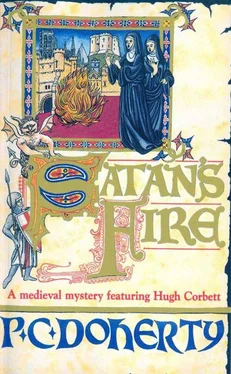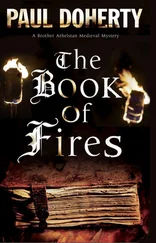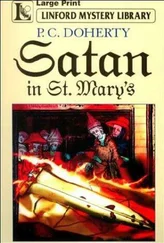Paul Doherty - Satan's Fire
Здесь есть возможность читать онлайн «Paul Doherty - Satan's Fire» весь текст электронной книги совершенно бесплатно (целиком полную версию без сокращений). В некоторых случаях можно слушать аудио, скачать через торрент в формате fb2 и присутствует краткое содержание. Год выпуска: 2012, ISBN: 2012, Издательство: Headline, Жанр: Исторический детектив, на английском языке. Описание произведения, (предисловие) а так же отзывы посетителей доступны на портале библиотеки ЛибКат.
- Название:Satan's Fire
- Автор:
- Издательство:Headline
- Жанр:
- Год:2012
- ISBN:9780755350360
- Рейтинг книги:3 / 5. Голосов: 1
-
Избранное:Добавить в избранное
- Отзывы:
-
Ваша оценка:
- 60
- 1
- 2
- 3
- 4
- 5
Satan's Fire: краткое содержание, описание и аннотация
Предлагаем к чтению аннотацию, описание, краткое содержание или предисловие (зависит от того, что написал сам автор книги «Satan's Fire»). Если вы не нашли необходимую информацию о книге — напишите в комментариях, мы постараемся отыскать её.
Satan's Fire — читать онлайн бесплатно полную книгу (весь текст) целиком
Ниже представлен текст книги, разбитый по страницам. Система сохранения места последней прочитанной страницы, позволяет с удобством читать онлайн бесплатно книгу «Satan's Fire», без необходимости каждый раз заново искать на чём Вы остановились. Поставьте закладку, и сможете в любой момент перейти на страницу, на которой закончили чтение.
Интервал:
Закладка:
The woodcutter lifted his windburnt face, though he refused to meet Corbett’s gaze. ‘Osbert,’ he muttered. ‘Verderer and woodcutter.’ He glanced back at his wife. ‘You’d best come in!’ he declared grudgingly.
Corbett told Maltote to guard the horses and they followed the woodcutter and his family into their long, shed-like house. A fire burnt on the stone hearth in the centre, the smoke escaping through a hole in the room. At the far end was a loft reached by a ladder where the family slept: there were a few sticks of furniture and shelves with some cooking pots on them.
‘You’d best sit where you can.’ The woodcutter pointed to the beaten earth floor.
Corbett, Ranulf and Claverley sat near the hearth. Corbett chatted to Osbert’s wife, putting her at her ease whilst her husband filled pewter cups with water. The woman smiled, pushing back her hair, and leaned over to stir the pot which hung above the hearth.
‘It smells delicious,’ Corbett remarked, though the odour was less than savoury.
‘What do you want?’ Osbert asked. He served the water and sat down opposite them. ‘You are a king’s clerk. You are used to eating better than this. Your servants carry water-bottles so you don’t need a drink.’
‘No, I don’t,’ Corbett replied. ‘And you, Master Osbert, have very sharp eyes. As do I. You buried those remains, didn’t you?’
The woodcutter’s wife scuttled away to look after the children who sat near the wall, thumbs in mouths, watching their visitors.
‘You found the remains,’ Corbett continued. ‘And, because you are an upright man, you buried them. You dug a hole beneath the boulder, hoping that would keep wild animals out and, with your axe, scratched a faint cross on it.’
‘Tell him,’ Osbert’s wife pointed at Corbett. ‘He knows!’ she shouted. ‘Or we’ll all hang!’
‘Nonsense,’ Corbett exclaimed. ‘Just tell me, Osbert.’
‘It was just before dawn,’ the woodcutter replied. ‘I was out hunting a fox, one of the chickens had been taken. I heard a whinny and found the horse just off the road: its leg was damaged. The horse limped towards me. I thought I’d died and gone to hell: the mangled legs of its rider were still in the stirrups. Blood and gore drenched the saddle. The horse was blown: I took the remains and buried them beneath the rock. I said a prayer, then I brought the horse home. I threw the saddle down a pit. I couldn’t sell it, it was too soaked in blood.’
‘And the horse itself?’
Osbert swallowed hard and pointed to the pot. ‘We are eating it.’
Ranulf coughed and spluttered.
‘We are hungry,’ Osbert continued. ‘Hungry for meat. All the deer have gone. They’ve got more sense than to stay near the city.’ He spread his dirty hands. ‘What could I do, Master? If I took the horse to market, I’d hang for a thief. If I’d kept it, the same might happen. The animal was sick, its leg was damaged and I know little physic. I killed it: gutted its belly, salted and pickled the rest and hid it away in a little hut deep in the forest, hung over some charcoal to smoke it and stop the putrefaction.’
‘And what else did you find?’ Corbett asked. He took two silver coins out of his purse. ‘Tell me the truth and these will be yours; there’ll be no recriminations over what you did.’
Osbert wetted his lips and pondered but his wife acted for him. She went to the far end of the hut, climbed the ladder to the bed-loft and returned carrying a set of battered saddle panniers over her arm. She slung these at Corbett’s feet.
‘There was a little money,’ Osbert grumbled. ‘Now it’s all gone. I bought the geese with it. What’s left is there.’
Corbett emptied the contents out: a jerkin, two pairs of hose neatly darned, a belt, a collection of small metal pilgrim badges and statues of saints, cheap geegaws to be bought outside any church. Finally a few scraps of parchment. Corbett studied the faded ink on these.
‘Wulfstan of Beverley,’ he announced. ‘A seller of religious objects and petty relics.’ He glanced at Claverley and Ranulf. ‘Why on earth would someone kill poor Wulfstan? Cut his body in two, send his horse galloping madly into the darkness and burn the top half?’ Corbett threw the saddlebag at Claverley. He got to his feet and pressed the two coins into Osbert’s hands. ‘Next time you go to Mass,’ Corbett added, ‘pray for the soul of poor Wulfstan.’
‘I did what I could,’ Osbert muttered. ‘God assoil him. Is there anything else, Master?’
Corbett asked, ‘In the forest, have you ever glimpsed a rider, masked and cowled?’
‘Once,’ Osbert replied. ‘Only once, Master, just after I found the horse. I was out cutting firewood on the edge of Botham Bar road. I heard a sound so I hid in the bracken. A rider passed, dressed like a monk. His horse was a nag and the cloak was tattered but I glimpsed a great two-handed sword hanging from the saddlehorn. I thought he was an outlaw so I stayed hidden until he passed.’ The woodcutter pulled a face. ‘That’s all I’ve seen.’
Corbett thanked him. They left the woodcutter’s, collected their horses and rode back on to the Botham Bar road. Ranulf and Claverley immediately became involved in a fierce argument over the eating of horseflesh. Maltote, pale-faced, could only feebly protest.
‘To eat a horse!’ he kept exclaiming. ‘To eat a horse!’
‘You would,’ Claverley called back. ‘My father told me how, in the great famine outside Carlisle, they caught rats and sold them as a delicacy.’
Corbett urged his horse on, only stopping when he came to the place where Wulfstan’s burnt remains had been found.
‘What are you looking for?’ Claverley called out as Corbett dismounted and walked into the line of trees.
‘I’ll tell you when I find it,’ Corbett replied.
He walked further in and crouched down to examine the great scorch-marks on the earth. He then drew his sword and began cutting the brambles and long grass. As he did so, Corbett glimpsed more, though much smaller, scorch-marks. And on the trees which fringed the undergrowth, Corbett noticed scratch-marks, as if some great cat had clawed the back, gouging and scarring it.
‘What on earth caused this?’ Claverley exclaimed, coming up behind him.
Corbett looked back towards the road where Maltote sat on his horse staring soulfully at them.
‘This is what I think happened,’ Corbett explained. ‘Someone came here to practise with the fire which burnt Wulfstan and the others.’
‘It looks as if the devil himself has swept up from hell,’ Claverley intervened. ‘His tail scorched the earth and his claws gouged the trees.’
‘Yes, you could sell such a story in York marketplace,’ Corbett replied. ‘But I am sure the Lord Satan has better things to do than journey up from hell to burn grass and brambles on the Botham Bar road. No. Somebody was practising with that fire, whilst the marks on the trees are made by arrows.’
‘So, the killer was firing arrows?’
‘Possibly,’ Corbett explained. ‘He created small fires, for God knows what reason, and practised shooting arrows using the trees as targets. Now I think he was so busy, so confident under the cover of dusk, that he failed to notice Wulfstan. Our poor relic-seller came trotting along the Botham Bar road, journeying to some village or market town to sell his geegaws. Now anyone else would have gone hastily by or even turned back. Wulfstan, however, was a pedlar, a man who loved to travel and collect stories as he did. He stopped where Maltote now is, probably calling out through the dusk. The assassin turns. He has been recognised. His horse stands nearby. He hurries up, draws his great two-handed sword hanging from the saddlehorn and rushes towards Wulfstan. The relic-seller would sit startled, frightened, immobile as a rabbit. He’d raise his hands to his face as the assassin swings that terrible sword, slicing his body in two with one savage cut.’
Читать дальшеИнтервал:
Закладка:
Похожие книги на «Satan's Fire»
Представляем Вашему вниманию похожие книги на «Satan's Fire» списком для выбора. Мы отобрали схожую по названию и смыслу литературу в надежде предоставить читателям больше вариантов отыскать новые, интересные, ещё непрочитанные произведения.
Обсуждение, отзывы о книге «Satan's Fire» и просто собственные мнения читателей. Оставьте ваши комментарии, напишите, что Вы думаете о произведении, его смысле или главных героях. Укажите что конкретно понравилось, а что нет, и почему Вы так считаете.












